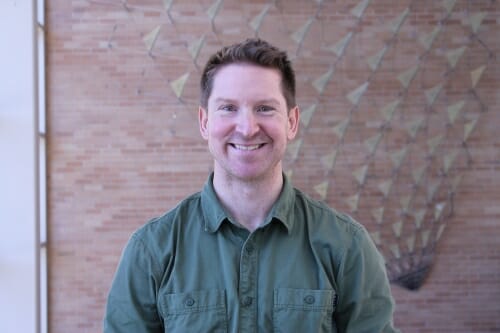New Faculty Focus: Lucas Richert
Name: Lucas Richert
Title: Associate Professor and George Urdang Chair of History of Pharmacy, Social and Administrative Sciences, School of Pharmacy
Hometown: Saskatoon, Saskatchewan (Canada)
Educational/professional background: B.A., University of Saskatchewan, 2003; MSc., University of Edinburgh, 2005; Ph.D., University of London, 2010.
Previous position (title, institution): Chancellor’s Fellow, Centre for the Social History of Health and Healthcare, University of Strathclyde (Glasgow, Scotland).
How did you get into your field of research? Early on, pharmaceutical history and policy grabbed my attention. But there was no grand design and I can’t pinpoint a single moment-of-clarity. I’ve been extremely lucky to have found tremendous role models in the field of alcohol and drug studies as well as the history of pharmacy and pharmaceuticals. I now study the interrelated histories of such substances as cannabis, LSD, and opioids.
What attracted you to UW–Madison? The university, of course, has a superb international reputation, but the nature of the position got my wheels turning. Taking up the role of Associate Professor – and a Chair in the History of Pharmacy –presented unique opportunities. I was very intrigued, for instance, by the possibility of serving as the Historical Director of the American Institute for the History of Pharmacy, which has been affiliated with UW–Madison’s School of Pharmacy since its founding in 1941. Yes, 1941! It’s one-of-a-kind.
What was your first visit to campus like? Brilliant, really. All the folks in the Social and Administrative Sciences Division in the School of Pharmacy were remarkable. As you would imagine, it was a little stressful when I arrived for the interview. That said, I felt like the campus was a natural fit for me: to generate research, build bridges, and share what I’m doing with the wider community.
Favorite place on campus? I’ve only been in Madison for a short time, to be fair. The Nielsen Tennis Center is cool and handy, while the Ebling Library has got tremendous views and great resources. I’m very much looking forward to exploring!
What are you most enjoying so far about working here? Meeting all the new people and tackling the challenges ahead.
Do you feel your work relates in any way to the Wisconsin Idea? If so, please describe how. I fundamentally agree with the ‘Wisconsin idea’ and this philosophy made my first visit here even better. My goal is to reach out beyond the School of Pharmacy’s walls and collaborate with other units on campus. I think it’s vital to bring historical context to current debates about opioids or cannabis legalization, for example.
What’s something interesting about your area of expertise you can share that will make us sound smarter at parties? No pressure, right! In my new book, Strange Trips: Science, Culture, and the Regulation of Drugs, I make the case that drugs like heroin or LSD take complex pathways as they move from radical and illegal drug to accepted parts of medical practice. Drug products, in other words, occupy “interstitial spaces” and may be refashioned as political, economic, and social circumstances require.
Hobbies/other interests: Cinema, squash.




